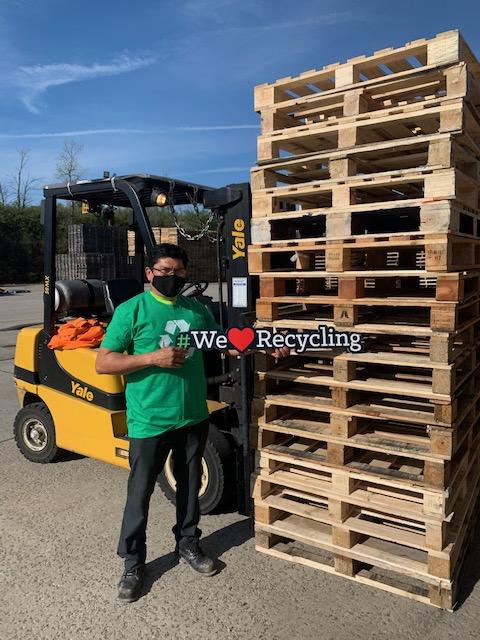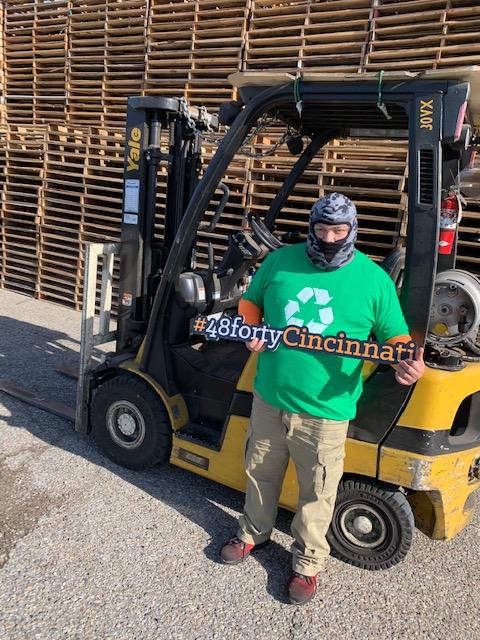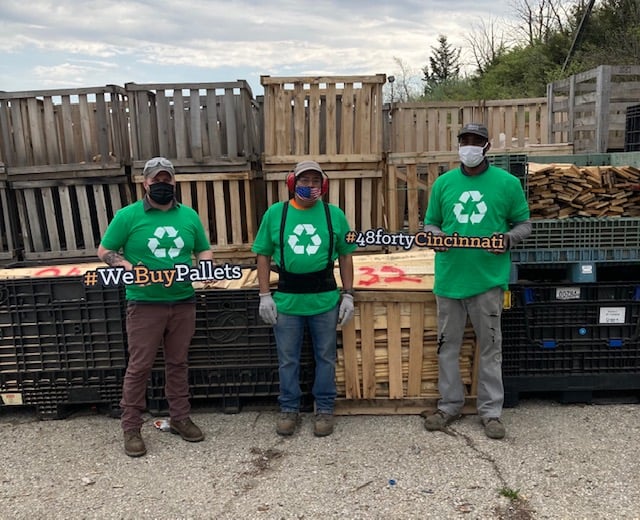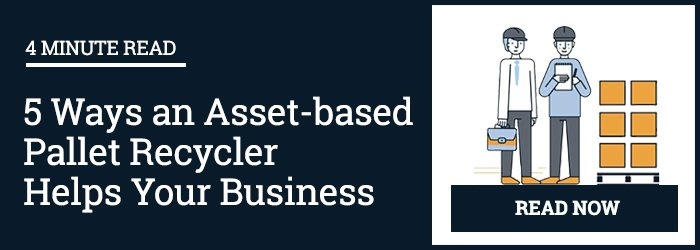Reduce Reuse Recycle: Meet Our Cincinnati, OH Plant
Wooden pallets can be recycled and reused in many ways, and each 48forty plant makes sustainable business practices a priority. See how our Cincinnati, OH plant is using the power of recycling to deliver quality pallets and keep additional waste out of landfills.
With lumber prices still-soaring, a Covid-driven demand for shipped goods, and ever-growing pressure toward eco-friendly consumption — there’s no better time to check in on the impact and efficiency of your supply chain. By choosing recycled pallets over new or plastic, it’s possible to make a more significant financial and environmental impact. And that’s where 48forty can help.
Wooden pallets are a versatile and eco-friendly solution because materials can be easily repurposed to extend the life of a pallet, build a new custom pallet, or create new materials. In fact, U.S. wooden pallets recently earned an Environmental Product Declaration (EPD). EPDs provide consumers with transparent and product-specific environmental information through independent certification, and this certification is the first for a product in the distribution packaging space. Additionally, this EPD includes Life Cycle Assessment (LCA) results for all stages of wooden pallets from cradle to grave, including production, use and end-of-life stages. When considering its lifecycle, wooden pallets can have a potential net carbon positive impact.

Isai Hernandez is our Cincinnati plant’s point person for the outside yard and sortation of reman and usable materials.
Reman Pallets: The Ultimate Green Solution
Wooden pallets can be recycled and reused in many ways, and each 48forty plant makes sustainable business practices a priority. Remanufactured (reman) pallets are particularly impactful because they allow us to use broken and damaged parts and further extend the lifespan of materials. (And save our customers money.)
Big Business Benefits
General Manager Nathan Vaughn leads our plant in Cincinnati, Ohio and has developed an excellent reman program with the help of his plant team. “Our team understands the sizes needed and those we can find a place for, and build them by piecing materials together. All day, every day, we’re able to build larger pallets out of shorter pieces that are structurally sound and meet our performance requirements.”

Jose Soto is a tenured forklift driver who puts in extra effort to sort tear down pallets by size.
Remanufactured (reman) pallets are built using what some might consider scrap material. The wood can be broken down and rebuilt to custom-sized pallets to meet the specific needs of our customers. Using material already housed at the plant reduces the need to use new lumber, leads to faster build times, and allows for quicker response times to changing market demands.
According to Vaughn, the Cincinnati plant designs and builds reman pallets for a growing list of industries. This includes landscaping products, paper products, medical devices, industrial equipment, and more. Reman pallets cost less than new wooden pallets, meet customer’s exact needs, and are tracked through 48forty’s quality program to ensure proper performance from the first trip to the last.
Environmental Impact
Besides benefits on the business side, reman pallets are a sustainable solution because they allow us to use broken and damaged parts and further extend the lifespan of materials. Once a wooden pallet has reached end of life, it can be repurposed into fuel or other materials, which can also reduce the need for natural gas—further adding to the potential net positive carbon impact.
There are nearly 2 billion pallets in the United States alone. Although there are many wooden pallets in circulation, each has a unique and renewable life cycle. Unlike other shipping materials, a typical wooden pallet is still considered new up until its fourth or fifth round trip. And as the pallet starts to show age, our pallet builders at 48forty replace worn boards so the pallet can continue to be used. Once a wooden pallet reaches end of life, it can be repurposed into fuel or other materials – further adding to the potential net positive carbon impact.

Left to right: Jason Macdonald, Assistant Plant Manager; Eufracino Fernandez, Saw Shop & Pressure Washer; Peter McGee, Supervisor.
We love recycling, and our Cincinnati plant is one of our facilities that goes above and beyond to keep as many pallets out of landfills as possible. “We push every day to repair every pallet and keep it out of the waste stream. If we start to see odd-sized pallets that aren’t considered common odd-sized pallets, we call around to see if anyone needs it,” explained Vaughn. “If not, we see what we can do with the materials to reuse it, rather than put it in as waste.”
The Cincinnati team takes a proactive approach to recycling materials beyond wooden pallets, too. The plant has developed partnerships with local businesses, including a plastic recycler and mulch facility, who repurpose anything that Vaughn’s team isn’t able to use. “We have just one small dumpster to dispose of every month to six weeks. That’s really the only landfill waste we contribute to,” says Vaughn.
Overall, recycled wooden pallets provide suppliers and retailers an agile, cost-effective, and sustainable solution to transport their products.
48forty: Pioneer in Pallet Recycling
48forty is the largest pallet recycling company in North America. We love recycling, and we are passionate about helping companies create a more eco-friendly and carbon-conscious supply chain, all while improving the bottom line.
Our ability to support customers as they incorporate sustainable practices into their procurement processes is significant, and we're excited to help companies green their pallet supply chain. If you’re looking to improve your operations while meeting your company’s business and environmental goals, get in touch

